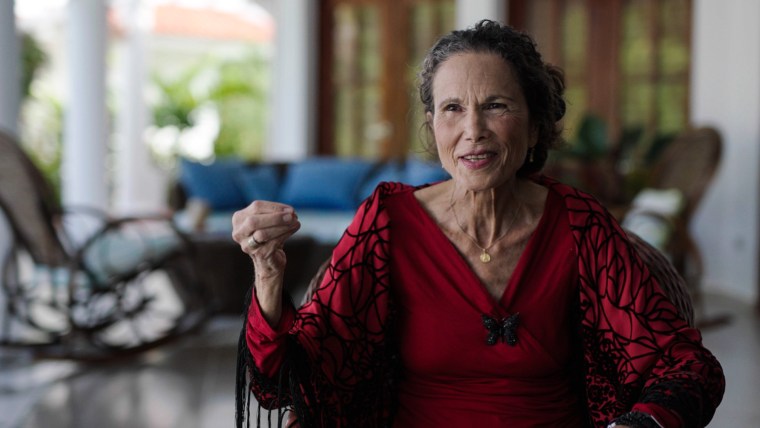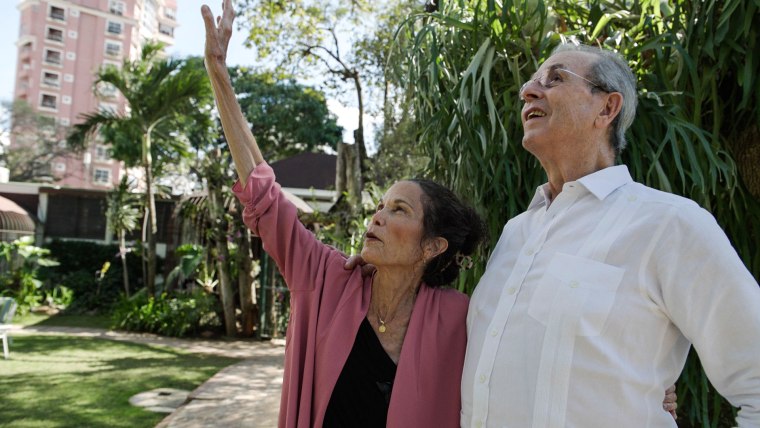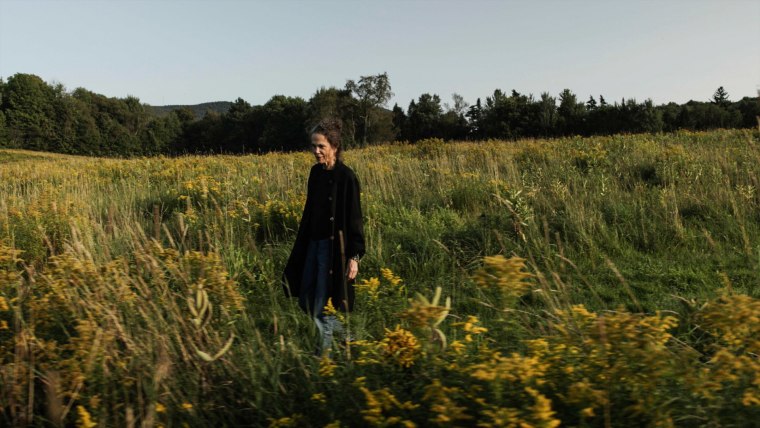Bestselling author Julia Alvarez is the subject of a new PBS documentary (original) (raw)
Sept. 17, 2024, 9:30 PM UTC
Her father was a chief surgeon, which gave her family financial comfort. But their political exile to Queens, New York, in 1960 would have a profound effect on her upbringing.
Now, a PBS documentary premiering Tuesday will show how bestselling author Julia Alvarez, who was born in New York and lived the first 10 years of her life in the Dominican Republic, became one of the country's most influential Latina writers and carved a path for other authors.
“If you’re at the margins of a world, it abuts another world. So you have double perspective,” Alvarez said in a video interview with NBC News. “And I see now that without that experience, I would never have become a writer.”
“Julia Alvarez: A Life Reimagined” takes viewers back to her childhood in the Dominican Republic and follows her footsteps in the U.S. as she develops into an acclaimed poet and author — President Barack Obama awarded her the National Medal of Arts in 2013.

VOCES "Julia Alvarez: A Life Reimagined."PBS
The documentary covers her breakout semi-autobiographical novel “How the García Girls Lost Their Accents” (1991) and her second novel, the searing bestseller “In the Time of the Butterflies” (1994), which chronicles the true story of the Mirabal sisters who rebelled against Dominican dictator Gen. Rafael Trujillo.
"Once we came to this country and once Papi (Dad) felt that he could talk because everyone was afraid, he told the stories of the Mirabal sisters," Alvarez said. "They were killed two months after we escaped. They were four sisters and three gave their lives to create a free country, depose the dictator, and we were four sisters, too. So we were the four sisters who had made it to safety, and I always felt the long shadow of those four sisters. ... So there was a sense of a connection there, a connection to their story."
“I originally set out to write nonfiction, a historical account of the Mirabal sisters,” she said. “But I became interested in character. And character is the province of novels.”

Alvarez published her latest novel, "The Cemetery of Untold Stories," at age 74. PBS
Alvarez reflected on how it took her a while to understand the traumas of a dictatorship through her parents.
"They were always so afraid of us speaking up, and always suspicious, and it helped me to understand them and their generation," she said. "The trauma, even after the dictator dies, a people is traumatized; the dictator stays in their imagination. So, it helped me to understand them and their generation, which has been called ‘la generación perdida’ (the 'lost generation') because so many in that generation lost their lives."
The documentary ends with her most recent novel, “The Cemetery of Untold Stories,” which Alvarez published this year at age 74. The book is about a veteran novelist who creates a graveyard for unfinished stories and characters.
Alvarez said that after arriving in Queens, she felt that her family “had lost everything.” But in spite of feeling like an outsider, poetry helped her find a new home.
“I think when I came into English as a 10-year-old, one of the reasons that I was attracted to poetry was that it was so rhythmic in cadence and it reminded me of Spanish,” she said. “It felt like a way that I could speak Spanish in English.”
Alvarez explained that she came from an oral culture in the Dominican Republic.
“I wasn’t really a reader,” she said. “We didn’t really have that many books around, but we had that oral rhythmic culture of recitations, and little poems and ditties.”
'All-American' includes southern Americas
One of the poems that inspired Alvarez once she was in the U.S. was “I, Too” by the Harlem Renaissance poet Langston Hughes.
In the poem, Hughes wrote: “Tomorrow, I’ll be at the table when company comes. Nobody’ll dare say to me, ‘Eat in the kitchen,’ then.”
Alvarez recalled how reading that verse felt like Hughes was making a promise — she too could someday sit at the table of mainstream America.
This would later inspire her to write “I, Too, Sing América,” a take on Hughes' poem, where she defines herself as “truly an all-American writer.”
“I really am an all-American citizen, including all of the southern Americas that we sometimes leave out when we say America. So, I think of myself very much as permeable,” she said, “those skills of really connecting over the artificial hurdles that people create of us and them, and identity that has to be set, is something that you learn to shed when you’re writing.”
And with more than three decades as a published author, Alvarez still uses poetry to boil down her writing to essential truths.
“I begin each writing day by reading poetry, even when I’m writing prose because for me that sort of sets a high bar for what language can also do,” she said. “In poetry you strip all the unessential away.”
Chronicling a dictatorship, through a female lens
When examining Alvarez’s legacy, the documentary establishes her as one of the most significant voices in Latina literature.
“Julia has carved a path for young women and their voices to break into the American mainstream,” Cuban American filmmaker Adriana Bosch said in a phone interview. She produced and directed “Julia Alvarez: A Life Reimagined.”
Bosch explained that Alvarez’s writing shifted the lens from male-dominated stories to female-dominated stories.
“She wanted to tell the story of migration from a female point of view. And I think she hits this idea on all cylinders with ‘In the Time of the Butterflies,’” she said.

Alvarez is widely considered one of the most influential contemporary Latina writers. PBS
Bosch noted that Latin American literature has a long tradition of writing about dictatorship from a male point of view. But when Alvarez decided to write her second book about the Trujillo regime, she told it from the female point of view — what was happening to women under the dictatorship.
“This is a new way at looking at history, putting the female viewpoint front and center,” she said. “And this is very empowering for young readers, young women, because they can see themselves and their conflicts.”
When asked what type of writer Alvarez could have become if she had stayed in the Dominican Republic, the author explained that it would have been a different experience.
“I would have been growing up in a dictatorship where writers were suspect, where books, people that read and thought and spoke about ideas were dangerous,” she said. “I think in our countries, just the act of writing is a political statement. You are opening doors and windows and that’s already a kind of freedom fighter.”
Yet growing up as an outsider in the U.S. sparked another type of fighting spirit, Alvarez reflected.
“Truthfully, I think not being embedded in the culture allowed me to see things about it that I might not have seen if I were in it,” she said.
This, she concluded, made her an “activist through art.”
For more from NBC Latino, sign up for our weekly newsletter.
Arturo Conde
Arturo Conde is an editor and a bilingual freelance journalist. He writes for La Opinión A Coruña and has been published in Fusion, Univision and City Limits.